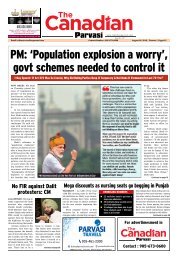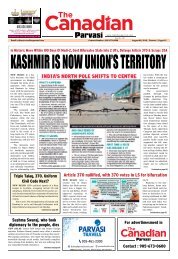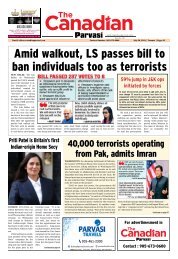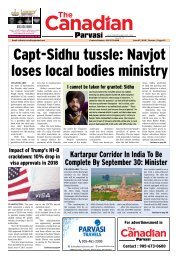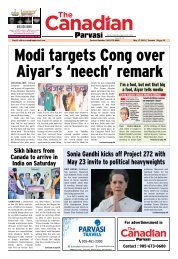Create successful ePaper yourself
Turn your PDF publications into a flip-book with our unique Google optimized e-Paper software.
<strong>The</strong> International News Weekly July 28, 2017 | Toronto 08<br />
NEWS<br />
India will have more<br />
than 850 million online<br />
users by 2025<br />
NEW DELHI: India will have more than 850 million online<br />
users by 2025, with Reliance Jio 4G triggering most<br />
of the growth which has added 100 million connections in<br />
just seven months, a survey revealed on Thursday.<br />
"While it took the country eight years to reach 250<br />
million 3G connections, Reliance Jio 4G network added<br />
100 million connections in just seven months," said<br />
the survey conducted by the Boston Consulting Group<br />
(BCG). It estimated that by 2020, half of all Internet users<br />
in India will be rural, 40 per cent of whom will be women<br />
and 33 per cent will be of 35 years of age or older. "Digital's<br />
impact is becoming pervasive across all consumer segments.<br />
This breaks the earlier trend in the country when<br />
the initial digital consumers were male, millennial and<br />
mostly metro-based," the survey noted.<br />
It predicted that digitally influenced spending, which<br />
currently stands at $45 billion-$50 billion a year, may<br />
increase more than tenfold to between $500 billion-$550<br />
billion."This will account for 30 per cent to 35 per cent<br />
of all retail sales by 2025," the survey found. <strong>The</strong> survey<br />
examined the changing behaviour of Indian consumers<br />
across more than 50 product categories through questionnaires<br />
and interviews with more than 10,000 consumers<br />
in 30 locations nationwide. IANS<br />
Talking to yourself may<br />
help control emotions<br />
NEW YORK: Feeling stuck in negativity? Talking to<br />
yourself may help you control emotions without taking<br />
any additional mental effort, researchers say, adding the<br />
talk has to be in third person. <strong>The</strong> findings suggest that<br />
third-person self-talk may constitute a relatively effortless<br />
form of emotion regulation than using first person<br />
self-talk -- the way people normally talk to themselves.<br />
Third-person self-talk may also act as an on-the-spot<br />
strategy for regulating one's emotions, as many other<br />
forms of emotion regulation require considerable thought<br />
and effort, the researchers said. "Essentially, we think<br />
referring to yourself in the third person leads people to<br />
think about themselves more similar to how they think<br />
about others, and you can see evidence for this in the<br />
brain," said Jason Moser, Associate Professor at the Michigan<br />
State University in the US. "That helps people gain a<br />
tiny bit of psychological distance from their experiences,<br />
which can often be useful for regulating emotions," Moser<br />
added. For the study, published in the journal Scientific<br />
Reports, the team involved two experiments. In the first<br />
experiment, participants viewed neutral and disturbing<br />
images while their brain activity was monitored by an<br />
electroencephalograph. (IANS)<br />
Indian jailed for 30 months in<br />
US for selling gun silencers<br />
<strong>Canadian</strong> PM Justin Trudeau at BAPS Toronto on its 10th anniversary.<br />
Guiding Canada down a multicultural<br />
food path, with consequences<br />
By Sylvain Charlebois<br />
HALIFAX (Troy Media): <strong>The</strong> new<br />
principles Health Canada will use for its<br />
next food guide signal a complete revamp<br />
of our rainbow of food groups.<br />
It appears a plant-based diet will be<br />
strongly encouraged. We might even<br />
see a focus on more plant-based proteins<br />
like beans, lentils, nuts and tofu in the<br />
next Canada's Food Guide. This would<br />
represent a significant departure from<br />
what we've seen in the guide since its establishment<br />
in the 1940s.Health Canada<br />
also suggests other significant changes,<br />
making many traditional agriculture<br />
sectors anxious. While the guide's current<br />
format of groups and colours has<br />
proven convenient and simple, the proposed<br />
changes aim for a nutrition-based<br />
approach. That will likely group proteins<br />
and apply to all dietary needs, vegan or<br />
vegetarian lifestyles included.<br />
It probably won't abandon outright<br />
the main staples that <strong>Canadian</strong> consumers<br />
have embraced for decades, but the<br />
food guide will look and feel different.<br />
<strong>The</strong> next version will acknowledge, at<br />
last, that Canada has a dynamic, heterogenous<br />
food market. It will also encourage<br />
<strong>Canadian</strong>s to drink more water, and entice<br />
them to cook more and eat together.<br />
That's all good news.<br />
<strong>The</strong> current food guide clearly has<br />
baggage. <strong>The</strong> first guide, in 1942, was<br />
intended to build demand for <strong>Canadian</strong><br />
commodities during the Second World<br />
War. Concerns about food security were<br />
acute and Canada sought to be a food-sovereign<br />
nation. Agricultural embargoes<br />
were frequent. But things have changed<br />
and we have a more open food economy.<br />
<strong>The</strong> shift in food geopolitics means consumers<br />
have different choices and expectations.<br />
In the past, things went too far<br />
when commodity-driven recommendations<br />
were incorporated into the guide,<br />
supported by questionable science. For<br />
example, encouraging adult <strong>Canadian</strong>s<br />
to have two cups of milk a day is just absurd.<br />
We're one of few countries still advocating<br />
this.<br />
<strong>The</strong> Dairy Farmers of Canada may<br />
not like this but Canada in 2017 is a different<br />
place. Many immigrants don't<br />
drink milk. Many consumers suffer from<br />
intolerances and allergies. And we have<br />
many more choices than <strong>Canadian</strong>s had<br />
in 1942. This time, Health Canada did<br />
the right thing: it listened to <strong>Canadian</strong>s.<br />
More than 20,000 <strong>Canadian</strong>s have responded<br />
to requests for food guide suggestions,<br />
making the process more open<br />
and democratic than ever. Parents, teachers,<br />
physical education professionals and<br />
fitness enthusiasts, culinary experts, and<br />
many more community-based groups,<br />
including food banks, got involved. This<br />
is exactly what was needed.<br />
<strong>The</strong> principles suggested by Health<br />
Canada show they want a food guide<br />
primarily for <strong>Canadian</strong>s. However, that<br />
guide may be at odds with some agricultural<br />
policies. Canada's protectionist<br />
supply management system of quotas<br />
and tariffs shows that our dairy sector,<br />
for example, is vital to the agricultural<br />
economy and must be protected. <strong>The</strong><br />
dairy sector's economic contribution<br />
over the years has been unparalleled.<br />
However, <strong>Canadian</strong> per capita milk consumption<br />
has dropped significantly over<br />
the last few decades. <strong>The</strong> new food guide<br />
could lead <strong>Canadian</strong>s even further from<br />
milk, compromising the welfare of many<br />
farms. <strong>The</strong> same effects will be felt in the<br />
cattle industry.<br />
As we necessarily put consumers<br />
first, we also need to reflect on what will<br />
happen to <strong>Canadian</strong> farming. <strong>The</strong> next<br />
food guide will make the disconnect between<br />
<strong>Canadian</strong> agricultural policies and<br />
food consumption much more obvious.<br />
<strong>The</strong> new food policy framework, being<br />
considered by Agriculture Canada, must<br />
address this gap. In the end, though, what<br />
matters most is how the guide resonates<br />
with citizens and how it can be used. This<br />
won't be easy. <strong>The</strong> current version is really<br />
a tool for elementary schools, not for<br />
consumers looking for answers.<br />
Perhaps we'll need two guides: one<br />
for health professionals and one for regular<br />
consumers. Both would be designed<br />
to achieve similar outcomes, with messages<br />
articulated differently. For consumers,<br />
the economics of food should<br />
also be recognized. Food is expensive,<br />
and all consumers must be made aware<br />
of their options.Revamping our rainbow<br />
of food groups is obviously a multifaceted<br />
undertaking.<br />
(Sylvain Charlebois is a Senior Fellow Atlantic<br />
Institute for Market Studies)<br />
New York: An Indian citizen<br />
has been jailed for 30<br />
months by a federal court<br />
in Louisiana in the US for<br />
illegally selling gun silencers<br />
and planning to smuggle<br />
more of them disguised<br />
as auto parts.<br />
Mohit Chauhan, 31,<br />
who is from Pitampura in<br />
New Delhi and was sentenced<br />
on Tuesday, admitted<br />
before federal Judge<br />
Elizabeth E. Foote in April<br />
that he had dealt with firearms<br />
without a license.<br />
Alexander C. Van Hook,<br />
the acting federal prosecutor<br />
for Western Louisiana,<br />
said on Wednesday that<br />
Chauhan was contacted<br />
by someone who wanted<br />
to buy silencers and he discussed<br />
by email and phone<br />
manufacturing silencers<br />
for the client.<br />
<strong>The</strong> silencers were to<br />
be imported as "auto parts"<br />
to evade customs, Hook<br />
said.<br />
Chauhan brought silencer<br />
parts to the Louisiana<br />
city of Shreveport<br />
in December to show the<br />
buyer, according to the<br />
prosecutor.<br />
When they met in restaurant<br />
in Bossier City to<br />
discuss the sale, federal<br />
agents recorded their conversation,<br />
leading to his<br />
prosecution, Hook said.<br />
Chauhan lacked a<br />
licence to deal in firearms<br />
and the parts had been<br />
brought illegally into the<br />
US. His customer was not<br />
publicly identified. IANS<br />
Nasir Bhasir<br />
Photographer<br />
Glamor/Fashion Portfolios<br />
Family / Children Portraits<br />
Weddings / Engagements & Other Functions<br />
Product Photography<br />
Passport / ID Photos<br />
E: bnasir88@hotmail.com<br />
Award<br />
Winning<br />
Photographer




